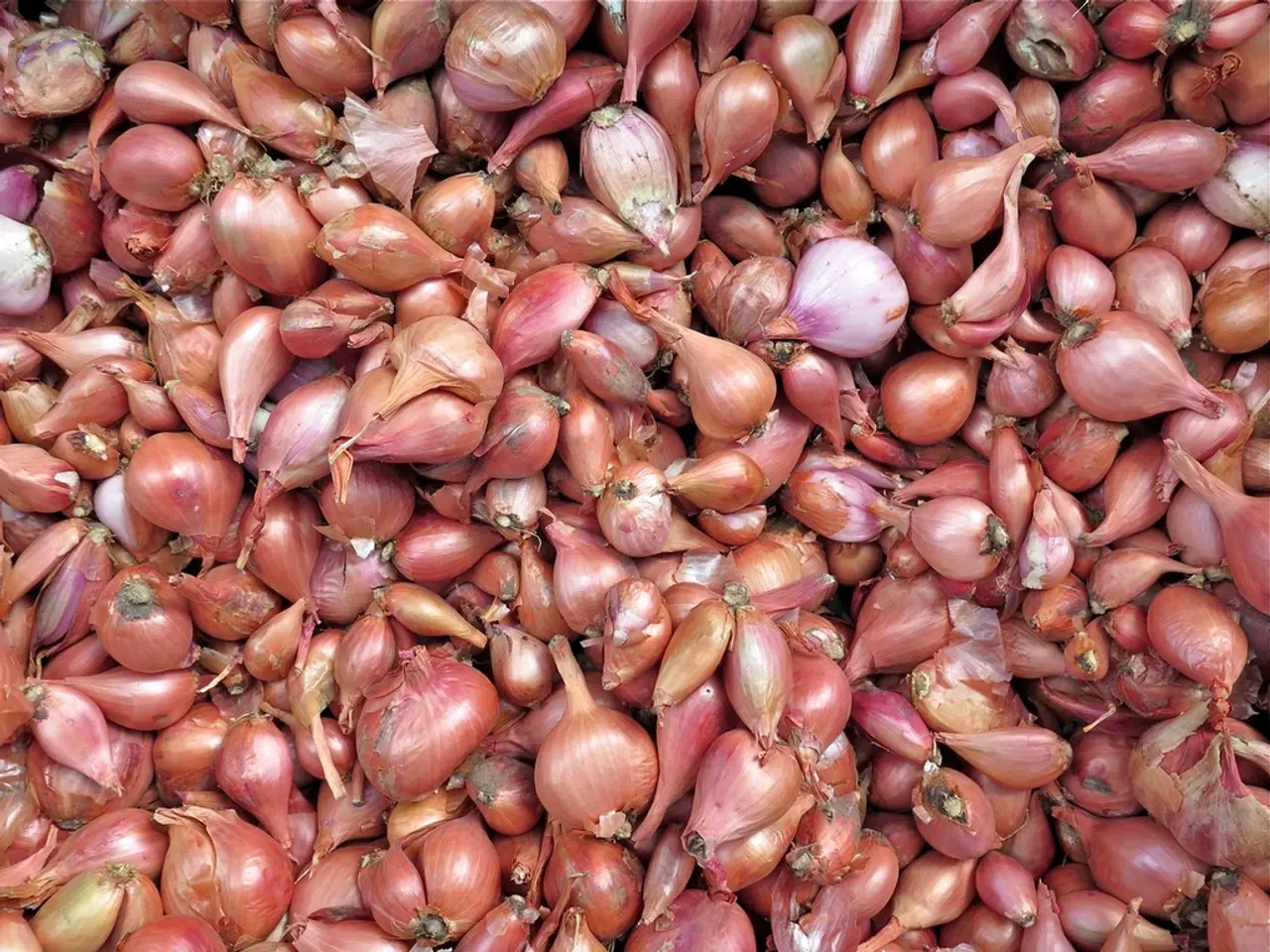Allergy to onions: Signs, identification, management, and further information
In the world of food allergies, onion allergy is a relatively common condition that affects many individuals. This article aims to provide a clear and concise guide on the symptoms, diagnosis, and treatment options for those living with an onion allergy.
If you or someone you know experiences symptoms such as swelling, trouble breathing, itching, hives, or a tingling sensation in the mouth or throat, it is crucial to seek immediate emergency care. These symptoms may be indicative of an onion allergy, particularly when related to oral allergy syndrome caused by cross-reactivity with pollen allergens.
Onion allergy symptoms can vary greatly, ranging from mild oral discomfort to severe systemic reactions. In addition to the aforementioned symptoms, individuals may also experience watery eyes, swelling in the face or tongue, nausea, vomiting, abdominal pain, and breathing difficulties like wheezing and gasping. In extreme cases, severe allergic reactions or anaphylaxis can occur, involving chest tightness, dizziness, rapid heartbeat, or loss of consciousness.
Diagnosing an onion allergy typically involves a detailed history of symptoms related to onion intake, followed by skin prick tests or blood tests to detect specific IgE antibodies to onion proteins. In some cases, oral food challenges under medical supervision may be performed to confirm the allergy. It is essential to distinguish onion allergy from food intolerance or sensitivity, such as digestive symptoms caused by FODMAPs (fructans) in onions, as intolerance often causes digestive stress rather than immune-mediated allergic symptoms.
Once diagnosed, the primary treatment for an onion allergy is strict avoidance of onions and related allium plants like garlic. Carrying emergency medication such as antihistamines for mild reactions and epinephrine auto-injectors for those with a history of severe reactions or anaphylaxis is also crucial. Managing accidental exposures with prompt treatment, as advised by a healthcare provider, is essential. For some with oral allergy syndrome, cooking onions thoroughly may reduce allergenicity, but avoidance is generally safer.
It is important to note that there is no known cure for an onion allergy. People with an onion allergy may need to avoid foods with onion-derived ingredients, such as onion powder. If you think you have trouble digesting onions, it is advisable to discuss this with a doctor.
The Food and Drug Administration (FDA) requires food manufacturers to list the ingredients in their products, which can help avoid onions. The American College of Allergy, Asthma, and Immunology (ACAAI) recommends that people with food allergies wear a medical alert bracelet that lists their allergy triggers. The ACAAI also recommends that people at risk carry an epinephrine auto-injector device, such as an EpiPen, and should carry two in case of a severe allergic reaction.
Cross contamination or inhalation of onions can also trigger an allergic reaction. Therefore, it is essential for individuals with onion allergies to be vigilant about the foods they consume and the environments they are in.
In summary, onion allergy symptoms range from mild oral discomfort to severe systemic reactions. Diagnosis relies on clinical evaluation and allergy testing, and treatment primarily involves avoidance and readiness to manage allergic responses. For those living with an onion allergy, understanding the symptoms, diagnosis, and treatment options is crucial for maintaining a safe and healthy lifestyle.
- An onion allergy diagnosis may require skin prick tests, blood tests, or oral food challenges under medical supervision to detect specific IgE antibodies to onion proteins.
- In cases of mild onion allergy reactions, antihistamines can provide relief, while epinephrine auto-injectors are essential for those with a history of severe reactions or anaphylaxis.
- The FDA requires food manufacturers to list the ingredients in their products, which can help manage an onion allergy.
- The American College of Allergy, Asthma, and Immunology (ACAAI) recommends that people with food allergies wear a medical alert bracelet that lists their allergy triggers.
- For some with oral allergy syndrome, cooking onions thoroughly may slightly reduce allergenicity, but avoidance is generally safer.
- People with an onion allergy may need to avoid foods with onion-derived ingredients, such as onion powder or onion-flavored seasonings.
- Cross contamination or inhalation of onions can also trigger an allergic reaction, so it's crucial for individuals with onion allergies to be vigilant about their food and the surrounding environment.
- In the workplace, it's important for employers to provide a safe and supportive environment for employees with food allergies, such as providing area for food storage and avoiding shared equipment or common areas.
- Chronic-kidney-disease patients may be at increased risk of complications from onion allergies due to existing health conditions, so it's important to discuss any symptoms with a healthcare provider.
- Type-2-diabetes management may involve making changes to diet and lifestyle, which can include cooking healthier meals and managing food-and-drink choices.
- For individuals with skin conditions like psoriasis, practicing skin-care routines that avoid onion-based ingredients can help reduce triggers and symptoms.
- Onion allergy symptoms can manifest in respiratory conditions, such as wheezing and gasping, and should be taken seriously as potential signs of anaphylaxis.
- Eye-health can also be affected by food allergies, with symptoms like watery eyes or itching, so it's important to avoid onions and related products if experiencing allergic reactions.
- Educating oneself on nutrition and healthy-cooking techniques can help manage onion allergies and improve overall health-and-wellness.
- Mental-health conditions like depression can impact the ability to manage food allergies, so seeking support through therapy or support groups can help improve well-being.
- Building relationships with family members, friends, and healthcare providers can help provide wasways to navigate challenges and manage onion allergies.
- Learning about global-cuisines can help expand the menu options for people with onion allergies and broaden mealtime experiences.
- Developing personal-growth goals around nutrition, fitness-and-exercise, education-and-self-development, and mindfulness can help improve overall well-being and reduce the impact of onion allergies on daily life.




